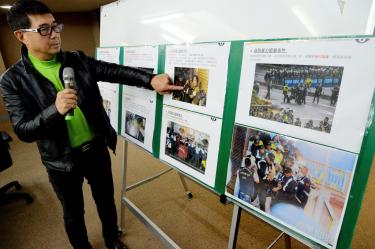Representatives from media worker groups and academics yesterday accused the Taipei City Police Department of using excessive force against reporters in recent protests and trying to evade public scrutiny of what they described as police’s infringement of freedom of the press.
The violent eviction of reporters on March 24, when thousands of protesters occupied the Executive Yuan compound, and on April 28, during an overnight antinuclear sit-in on Zhongxiao W Road, violated the media’s right to report, the representatives told a press conference.
Citing the Constitution, the Universal Declaration of Human Rights and the International Covenant on Civil and Political Rights, the representatives condemned the police’s actions and called on the police to stop impeding with media freedom and using violence against reporters.
The National Police Agency and the Taipei City Police Department refused to send officials to the press conference because such an appearance would represent “tacit recognition” of the complaints, said Democratic Progressive Party Taipei City Councilor Hsu Chia-ching (徐佳青), who hosted the press conference.
Hsu said that if the police choose to ignore the Constitution and international covenants and refuse to be held accountable, she would not rule out proposing a regulation in the city council to regulate police treatment of reporters.
The media representatives — from the Association of Taiwan Journalists, the Association of Taipei Photojournalists and independent journalists’ trade unions and television companies’ unions — said the accusations of excessive police force were backed by video footage and photographs.
Some of the photographs and several video clips documented police violence and use of water cannons against journalists and photographers were on view at the press conference.
“The past two months was a period that saw the most police interference with news reporting in recent memory,” Public Television System (PTS) Trade Union president Wang Yen-chieh (王燕杰) said.
At least three PTS reporters were evicted or suffered violence on March 24, Wang said, including one woman who was deliberately targeted with a water cannon, despite standing far away from the demonstrators.
Citing the police’s eviction of journalists from the lobby of the Executive Yuan before they began removing protesters from the building, and the physical assault against two photographers on a pedestrian overpass on April 28, Association of Taipei Photojournalists president Chiou Rung-ji (邱榮吉) said the police had ignored the Council of Grand Justices’ constitutional Interpretation No. 689.
The interpretation stipulates that journalists’ freedom of movement, freedom from bodily and mental harm, and freedom from interference in the public domain must be protected.
“Infringement of journalists’ right to report was primarily why Taiwan’s media freedom ranking in the world dropped this year — from 47th to 48th in the Freedom House ranking and from 47th to 50th in the Reporters Without Borders ranking,” Association of Taiwan Journalists president Chen Hsiao-yi (陳曉宜) said.
A country without respect for media freedom cannot call itself a democratic country, National Taiwan University journalism professor Chang Chin-hwa (張錦華) said.
It was a “stupid move” on the part of the police to try to keep their misconduct from being reported by removing journalists and photographers, because the public could record what was happening with their smartphones.
Source: Taipei Times - 2014/05/08





















